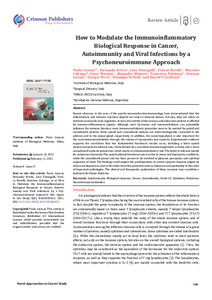Por favor, use este identificador para citar o enlazar este ítem:
https://repositorio.uca.edu.ar/handle/123456789/13679| Título: | How to modulate the immunoinflammatory biological response in cancer, autoimmunity and viral infections by a psychoneuroimmune approach | Autor: | Lissoni, Paolo Brivio, Fernando Fumagalli, Luca Rovelli, Franco Colciago, Massimo Messina, Giusy Monzon, Alejandra Pelizzoni, Francesco Lissoni, Arianna Porro, Giorgio Di Fede, Giuseppe Cardinali, Daniel Pedro |
Palabras clave: | CANNABINOIDES; CANCER; COVID-19; CITOQUINAS; MELATONINA; NEUROPROTECCION; INMUNOLOGIA; SISTEMA INMUNOLOGICO | Fecha de publicación: | 2021 | Editorial: | Crimson | Cita: | Lissoni, P. et al. How to modulate the immunoinflammatory biological response in cancer, autoimmunity and viral infections by a psychoneuroimmune approach [en línea]. Novel approaches in cancer study. 2021, 5 (5). doi: 10.31031/NACS.2021.05.000622. Disponible en: https://repositorio.uca.edu.ar/handle/123456789/13679 | Resumen: | Abstract: Recent advances in the area of the psycho-neuroendocrine-immunology have demonstrated that the inflammatory and immune reactions depend not only on immune factors, but also, they are under an intricate neuroendocrine regulation. In turn, the activity of the nervous and endocrine systems is affected by immune-inflammatory signals. Although most hormones and neuromodulators can potentially influence the immune function, main immunomodulatory properties seem to be exerted by opioid and cannabinoid systems. Brain opioid and cannabinoid systems are endocrinologically connected to the adrenal, and to the pineal gland, respectively. In addition, the neurohypophysis is also important for the neuroimmunomodulation through the release of vasopressin and oxytocin. Experimental evidence supports the conclusion that two fundamental functional circuits occur, including a brain opioid system-vasopressin-adrenal axis, characterized by a prevalent immunosuppressive activity, and a brain cannabinoid-oxytocin-pineal axis, which exerts an immunostimulatory role. The latter is relevant mainly for anticancer immunity. The opioid-adrenal functional axis is active in stress and depressive conditions, while the cannabinoid-pineal axis has been proven to be involved in pleasure perception and spiritual expansion of mind. The findings could explain the predisposition to severe systemic diseases played by stress and depression, and on the other hand the protective action of pleasure and spirituality in the onset of important pathologies. The clinical and therapeutic applications of these concepts may constitute a landmark for future Medicine. | URI: | https://repositorio.uca.edu.ar/handle/123456789/13679 | ISSN: | 2637-773X | Disciplina: | MEDICINA | DOI: | 10.31031/NACS.2021.05.000622 | Derechos: | Acceso abierto | Fuente: | Novel approaches in cancer study. 2021, 5 (5) |
| Aparece en las colecciones: | Artículos |
Ficheros en este ítem:
| Fichero | Descripción | Tamaño | Formato | |
|---|---|---|---|---|
| how-to-modulate.pdf | 803,78 kB | Adobe PDF |  Visualizar/Abrir |
Visualizaciones de página(s)
107
comprobado en 27-abr-2024
Descarga(s)
64
comprobado en 27-abr-2024
Google ScholarTM
Ver en Google Scholar
Altmetric
Altmetric
Este ítem está sujeto a una Licencia Creative Commons

